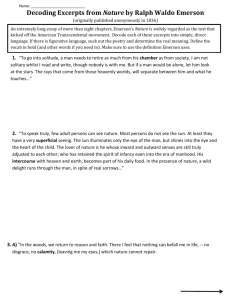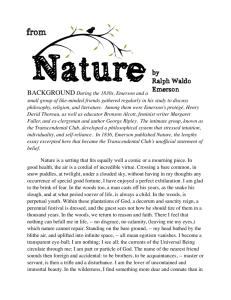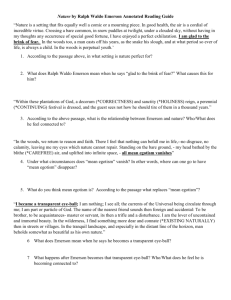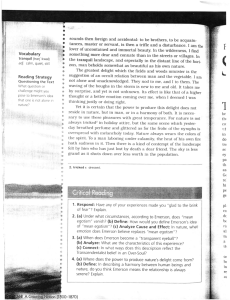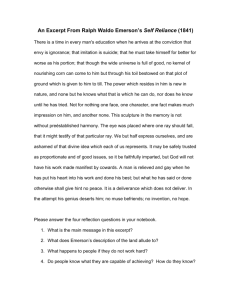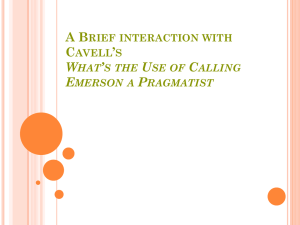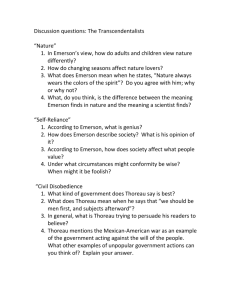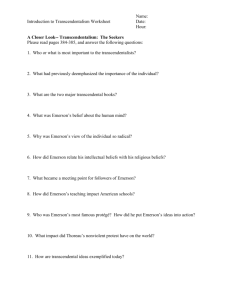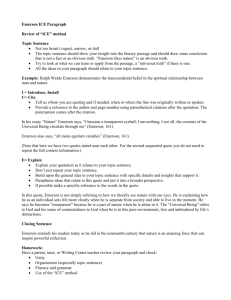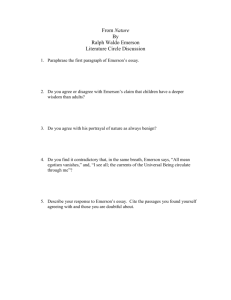Emerson Nature Questions - Staff Portal Camas School District
advertisement
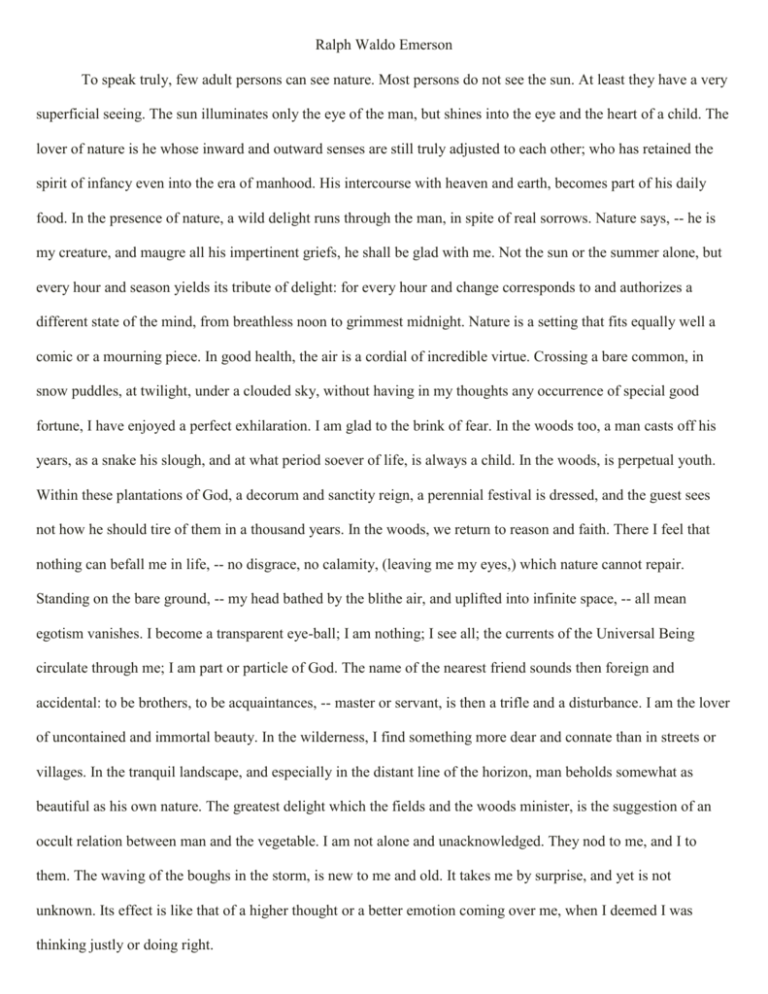
Ralph Waldo Emerson To speak truly, few adult persons can see nature. Most persons do not see the sun. At least they have a very superficial seeing. The sun illuminates only the eye of the man, but shines into the eye and the heart of a child. The lover of nature is he whose inward and outward senses are still truly adjusted to each other; who has retained the spirit of infancy even into the era of manhood. His intercourse with heaven and earth, becomes part of his daily food. In the presence of nature, a wild delight runs through the man, in spite of real sorrows. Nature says, -- he is my creature, and maugre all his impertinent griefs, he shall be glad with me. Not the sun or the summer alone, but every hour and season yields its tribute of delight: for every hour and change corresponds to and authorizes a different state of the mind, from breathless noon to grimmest midnight. Nature is a setting that fits equally well a comic or a mourning piece. In good health, the air is a cordial of incredible virtue. Crossing a bare common, in snow puddles, at twilight, under a clouded sky, without having in my thoughts any occurrence of special good fortune, I have enjoyed a perfect exhilaration. I am glad to the brink of fear. In the woods too, a man casts off his years, as a snake his slough, and at what period soever of life, is always a child. In the woods, is perpetual youth. Within these plantations of God, a decorum and sanctity reign, a perennial festival is dressed, and the guest sees not how he should tire of them in a thousand years. In the woods, we return to reason and faith. There I feel that nothing can befall me in life, -- no disgrace, no calamity, (leaving me my eyes,) which nature cannot repair. Standing on the bare ground, -- my head bathed by the blithe air, and uplifted into infinite space, -- all mean egotism vanishes. I become a transparent eye-ball; I am nothing; I see all; the currents of the Universal Being circulate through me; I am part or particle of God. The name of the nearest friend sounds then foreign and accidental: to be brothers, to be acquaintances, -- master or servant, is then a trifle and a disturbance. I am the lover of uncontained and immortal beauty. In the wilderness, I find something more dear and connate than in streets or villages. In the tranquil landscape, and especially in the distant line of the horizon, man beholds somewhat as beautiful as his own nature. The greatest delight which the fields and the woods minister, is the suggestion of an occult relation between man and the vegetable. I am not alone and unacknowledged. They nod to me, and I to them. The waving of the boughs in the storm, is new to me and old. It takes me by surprise, and yet is not unknown. Its effect is like that of a higher thought or a better emotion coming over me, when I deemed I was thinking justly or doing right. Questions to Ponder 2 pts each 1. According to Emerson, why do most people only superficially see the sun? 2. How does Emerson define “the lover of nature”? 3. What might he mean by “the spirit of infancy”? 4. Identify the metaphor in the following sentence: “His intercourse with heaven and earth, becomes part of his daily food.” What is being compared? 5. In context, what might “maugre” mean? Think of a synonym to replace it. 6. What is the effect of personifying Nature the following sentence: “Nature says, -- he is my creature, and maugre all his impertinent griefs, he shall be glad with me ?” 7. Where does Emerson again use personification and how does his use of this rhetorical device add emphasis to the power of nature? 8. “Nature is a setting that fits equally well a comic or a mourning piece.” What does Emerson mean? Do you agree? 9. What does it mean “to be glad to the brink of fear”? What rhetorical device is employed in this expression? 10. Explain the analogy in the following sentences: “In the woods too, a man casts off his years, as a snake his slough, and at what period soever of life, is always a child. In the woods, is perpetual youth.” 11. Of all things that might befall Emerson, what is the one calamity that nature could not repair? Why would such a loss be devastating? 12. Discuss the paradoxes in the following sentences: “I become a transparent eye-ball; I am nothing; I see all; the currents of the Universal Being circulate through me; I am part or particle of God. The name of the nearest friend sounds then foreign and accidental: to be brothers, to be acquaintances, -- master or servant, is then a trifle and a disturbance. I am the lover of uncontained and immortal beauty.” 13. Define the word “occult” as it is used in this passage. 14. What is the antecedent for “it” in the last two sentences? 15. What is the main idea of last five or six sentences of this passage? Experiencing Nature 10 pts Emerson wanted his audience to look at some of the commonest elements of their lives and do focus on the natural environment surrounding them. Take Emerson’s advice and pay close attention to your natural environment this afternoon and evening. Don’t go out of your way to “find nature” but consider the nature surrounding your everyday life. Pick one aspect of this natural world and write a paragraph (or two) describing what you see, smell, hear and any interactions you have with this aspect of the outside world. Also reflect upon whether you interact with nature daily or you find yourself ignoring it as it may be a stagnant part of your life (ie not as important as school, your friends or Facebook).
